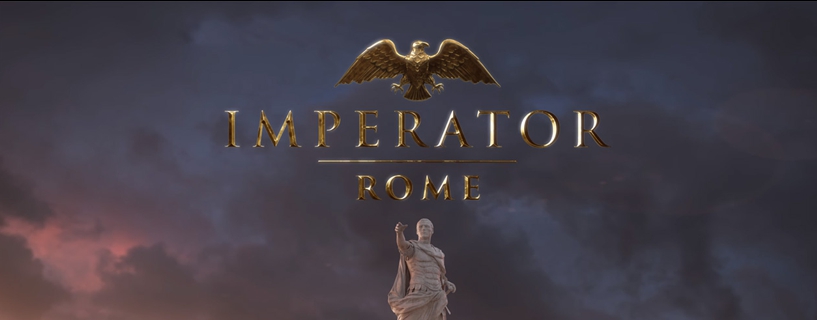Playing the new grand strategy game Imperator Rome calls to mind another Latin phrase: caveat emptor.
Type: Single-player
Genre: Strategy, Grand Strategy
Developer: Paradox Development Studio
Publisher: Paradox Interactive
Release date: 25 April, 2019


For a game that seems to take the adage “Rome wasn’t built in a day” literally, Imperator Rome offers you a veritable laundry list of details to (micro)manage as you conquer your foes, appease your allies, and lay waste to everything in between.
Expand your empire, quell the bickering of the senate, build up the largest army ever seen to slowly march across the known world, while you take on your neighbors through brute-number-crunching force. Despite the title, you don’t play as any single leader but instead you are the grand architect in a precarious balance between nation building and global conflict. Leaders come and go, individual dynasties flourish or wither, borders ebb and flow, but the one constant is that patience, slow and methodical patience, conquers all.
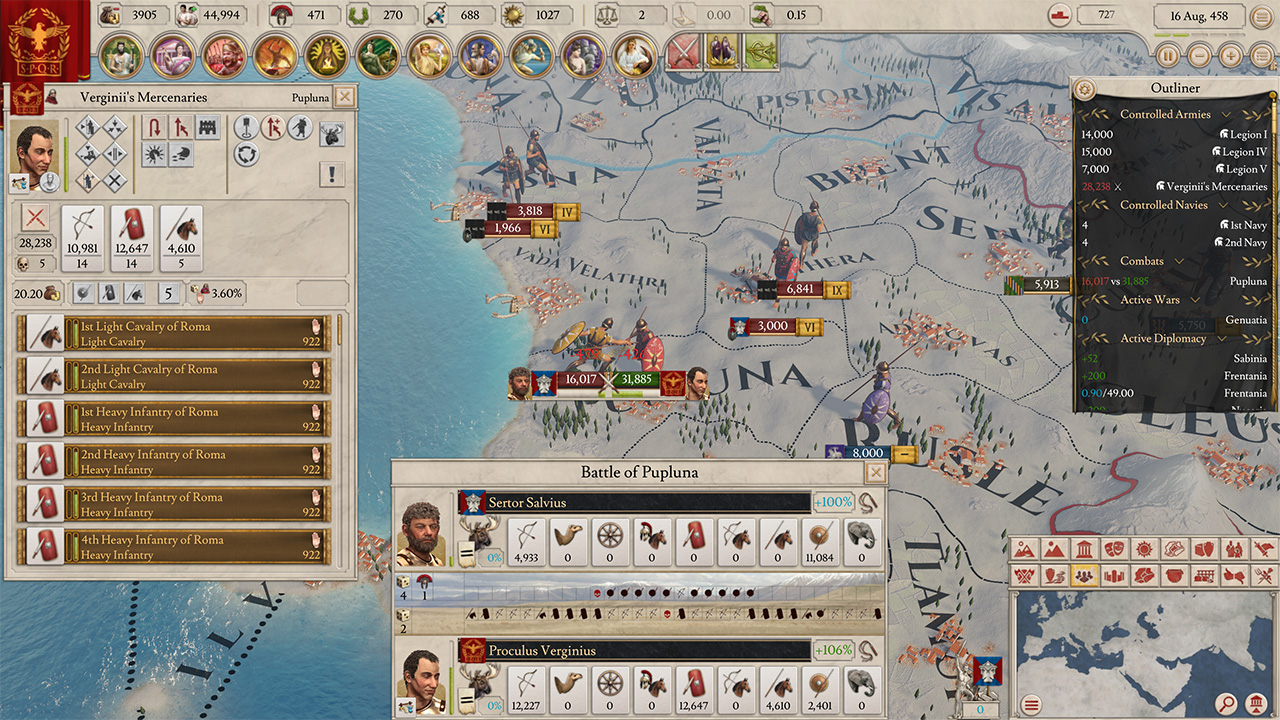
Obscurum Per Obscurius
Imperator Rome, it would appear, is a very divisive game: long-standing fans of Paradox, seem to hate it, while professional critics seem to love it. I should, therefore, be in the perfect spot to review this game with an unbiased eye, because I am neither of these things. I love strategy games, and am an absolute history nerd, but before now had not yet played a Paradox title; and even though I review games, I do so out of pure passion, not because I make my living at it. So that puts me in the unique spot of not having any previous gaming baggage going into Imperator Rome, nor am I beholden to driving clicks for a corporate review site. And yet, despite all of this, I was still struck with just how empty the entirety of Ancient Rome had been reduced to by this game.
So, first of all, yes, I am a bit embarrassed to admit that it has taken me this long to play a Paradox strategy title. In my defense, I tend to get obsessed with games of this nature and can easily spend all of my waking hours lost in futile attempts to conquer the world; but these days, time seems to be in ever shrinking quantities, so I have to be a bit more judicious. I’ve salivated over Europa Universalis IV for quite a while, but the absurd amount of DLC’s available for it have prevented me from making the time (and financial) commitment. Hence Imperator Rome seemed like a great way to ease into the Paradox universe. Since the scope was limited to classical antiquity, I figured this was a good way to satisfy my grand-strategy cravings without risking too many real-world hours. Ironically, I was right, but for all the wrong reasons.
As a newcomer to Paradox titles, the learning curve for Imperator Rome was daunting. I spent way too much time upfront just figuring out how things work. The built-in tutorial was useless, and there is no in-game help. Thankfully (or lazily, depending on how you want to view it), the developers provide links to Youtube videos walking you through various features. Light on actual information, but heavy on Paradox-jingoism, these videos at least gave me enough basic information to dive into the game with something vaguely resembling confidence.
One of the earliest stumbling blocks for me was that since Imperator Rome is not strictly turn based (it’s more of an RTS that can be paused while you execute actions) it was tough initially to find a flow, or rhythm to the gameplay. When I play strategy games, I tend to make mental check-lists for myself, which I systematically follow as I work towards expanding my dominion. But Imperator Rome is so open-ended that it often resembled a sort of Roman-themed sandbox more than a game with definable goals, and noticeably lacking in any discernible steps to attain these vaporous goals.
After untold hours spent getting up to speed, I finally began to grasp the gameplay, but that revelation made me slightly puzzled that I ever found it complex to being with. Imperator Rome is not a complex game, as it turns out; it’s actually a minimalist game given the illusion of complexity by a burdensome amount of variables. It’s like playing rock, paper, scissors on a map with about a thousand variables. Yes, there are a thousand options, but it’s still rock, paper, scissors.
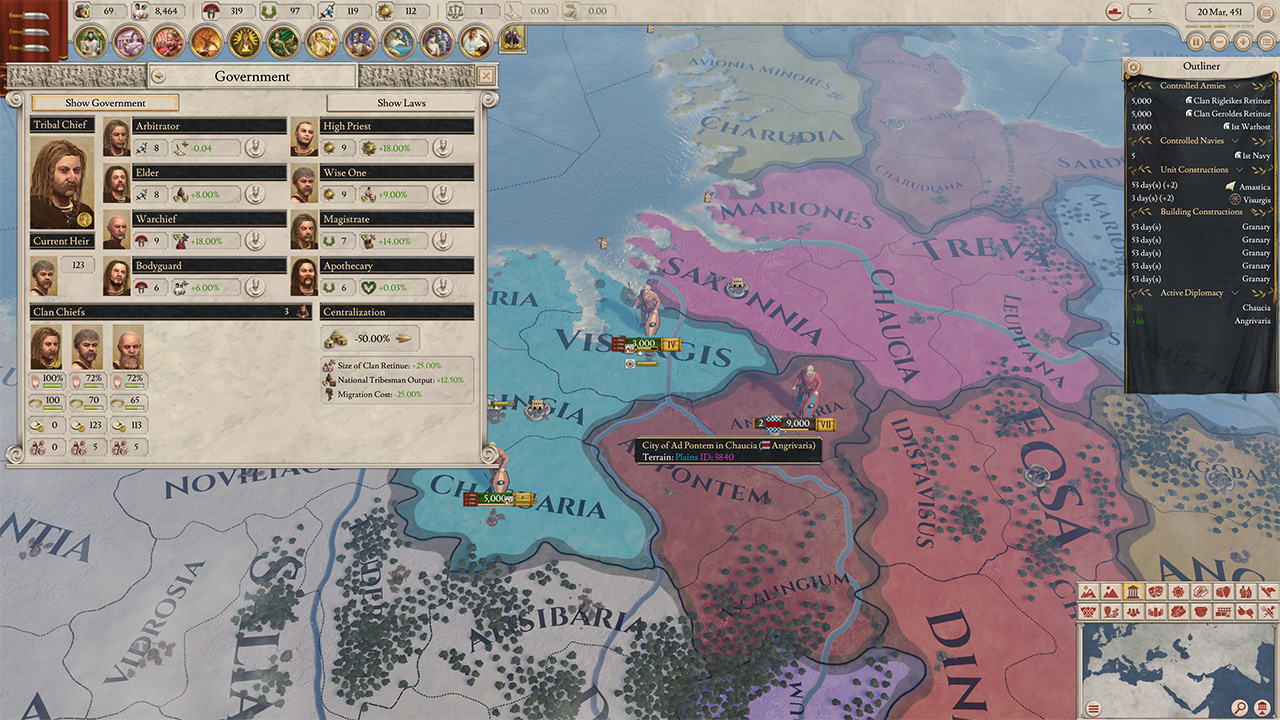
Ut Roma Cadit, Sic Omnis Terra
Your goal in Imperator Rome is to conquer, and as any good empire should, you do this by taking land, along with the population inhabiting it. People are your main resource, as they produce income through slave labor, troops for your armies, and noblemen for political appointments or generalships. Trading is introduced as an element of gameplay, but disappointingly is treated solely as an arbitrary modifier for labor or troops; there aren’t actually any resources to manage (as such), or in-depth deals to be made. In short, there’s no sense of progression in this game, your focus is solely on conquering, and any growth is misleading; you just start dealing with larger numbers, and larger territories.
Regarding combat, in theory you can customize a legion to have an advantage over your opponent by choosing the right troop composition (for example, archers are strong against infantry, but weak against cavalry, etc), but because everything moves so slowly in Imperator Rome, by the time you recruit the right troops and get everyone into position, the enemy has either moved on, or attacked before you had the chance. With this in mind, I found that I got consistently good-enough results with mixed units, so after a while stopped caring about the composition, and just starting aiming for quantity. The Mercenary system, for better or worse, also contributes to this rule-by-numbers approach. The idea is that there are bands of freelance mercenary armies that can be hired at a moment’s notice (for a premium) to crush your enemies by sheer volume, and then fired (for a premium) when you’re done. It could be an interesting mechanic, but it just reinforces the idea that quantity matters more than tactics. Oh, don’t get me wrong, I’m not implying that aren’t any tactics in the game, but that unless you’re a completionist, there’s often times very little need to rely on tactics because if you wait long enough you can amass the numbers and manna (which is needed to execute your commands) needed to overcome pretty much any foe. You just need patience, oodles of time, and very, very slow movement.
The Characters and Government mechanics should offer a refuge from the monotony of empire expansion, but these features feel like tacked on distractions instead of offering meaningful depth. All of the empire’s citizens who are available for appointment are listed, along with their spouses and children, and each have numerous stats, as well as life goals and weaknesses that determine their effectiveness if assigned to a legion or if they hold political office. This in itself is actually kind of interesting, as you can literally watch a family grow, the children mature and become members of the republic, all before your glazed-over eyes. The novelty of watching familial dynasties rise and fall wears off quickly, though, and they become just another way to modify your expansionist stats. And what few ways you do have to interact meaningfully with people or politics, the choices are very black and white.
Diplomacy fares slightly better, with options to form defensive leagues, create feudal states, or outright start a war of insults. It is indeed possible to slowly expand your empire through influence and alliances, but it’s clear this is not intended to be a major path to victory, as progress is sluggish, choices are finite, and other nations are fickle. Mostly, though, it’s a time and resource factor; it’s far faster and cheaper to claim casus belli and attack your neighbors, then to try and win them over diplomatically.
In the end, though, Imperator Rome is all about numbers. Things like player motivation, balance, and nuance don’t apply here. There are strictly defined rules, and only one way to approach them. If you’re the kind of person that looks at a spreadsheet and thinks, “If only this had a map…”, then Imperator Rome might be good fit. It can be a very left-brained experience, which is fine if you’re desperately into data, but for everyone else it might be a desolate, barren, passionless, and imagination-averse desert of gameplay.
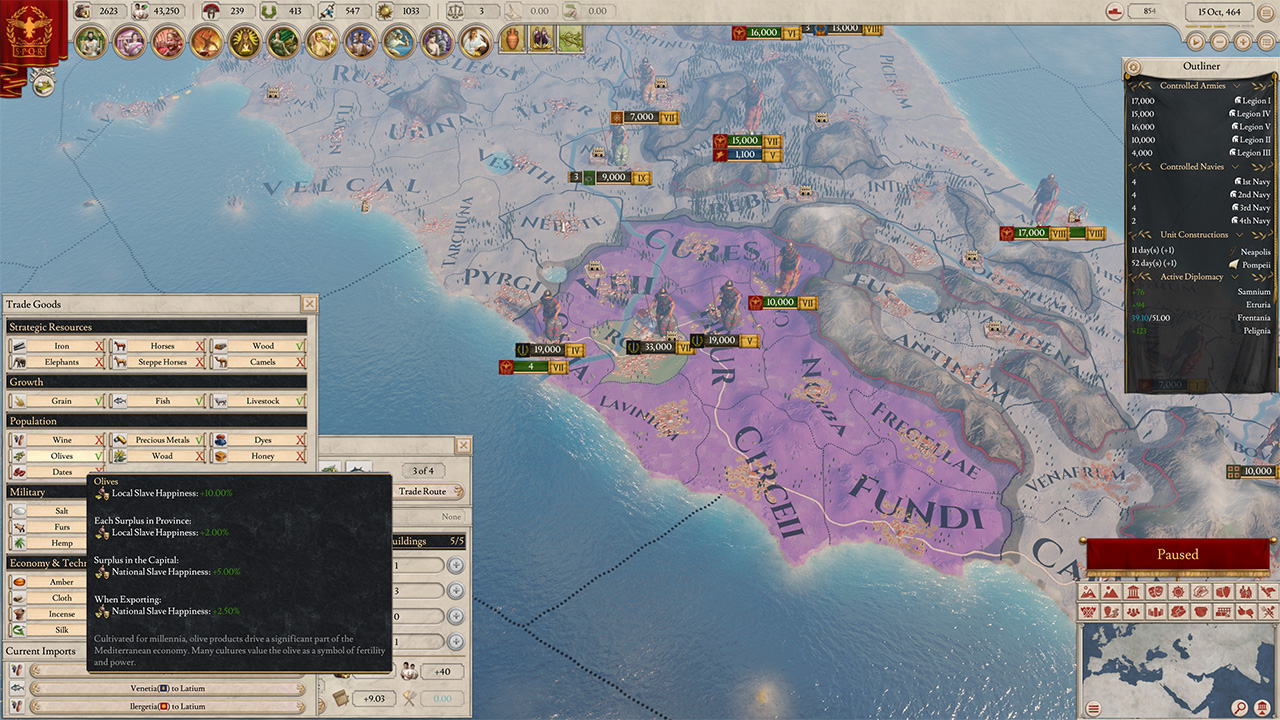
Semper Idem
As for the game itself, compared to other strategy titles, there are not many options to customize your play, what you see is what you get for the most part. There’s the unmistakable creep of sameness that permeates each session. Even though there are quite literally hundreds of starting nations to choose from (kudos to the devs for that, at least), they are more or less identical, with no distinguishing characteristics, abilities or features to make the experience any different. True, there are three types of government, which do mildly affect how you pass laws and offer a few other specific benefits, and true also that each nation has different geographical resources at its disposal, but these are hardly compelling reasons to seek replay after replay.
Many of the complaints from long-time Paradox players focus on the game being too similar to their other titles without bringing anything unique to the experience. For obvious reasons, I cannot speak to this criticism. What I can say, however, is that I’m terribly dismayed by just how antiquated the game feels; it earnestly belongs in an another era of gaming and stumbles geriactically onto the modern stage with nothing innovative to show for its age. In 2019, is this really the stat- of-the-art for grand strategy? If so, I fear for the genre. There are few new ideas here, and absolutely no quality-of-life game systems to make this stodgy format fresh, accessible, or enticing to either new or jaded audiences.
The AI is not as bad as others proclaim, it’s just a bit tame, obvious and predictable. I suppose this is a relief, as some games by contrast sport schizophrenic opponents whose behavior is so random as to veer into the nonsensical. I was actually ok with the timidity of Imperator Rome, as the rest of the game was so unwieldy that it helped to have that slight advantage. That’s not to say the game is easy, you will face numerous challenges, both internal and external, but these aren’t from the cunning of your opponents more than from artificial obstacles the developers throw at you to slow down what is already a glacially paced game. This is due in no small part to the perennial need to wait for manna to replenish so you can enact your next attack, which, tragically, looks an awful lot like your previous attack, and the one before that. The theater of war may get larger, but the stakes don’t scale with it.
The UI is a disaster unto itself, and makes playing the game more of a chore than it should be. This is, without exaggeration, one of the worst UI’s I’ve seen in any strategy game, new or old. It’s cramped, over-stuffed, illogical, locked down, and with an abundance of seriously tiny, almost hidden, bits of crucial information. The majority of the game is dictated by text and numbers, which pop up in verbose overlays that threaten to drown the world in statistical data. The redundancy and repetition of game elements and access to certain windows is probably meant to be helpful, but winds up being overkill.
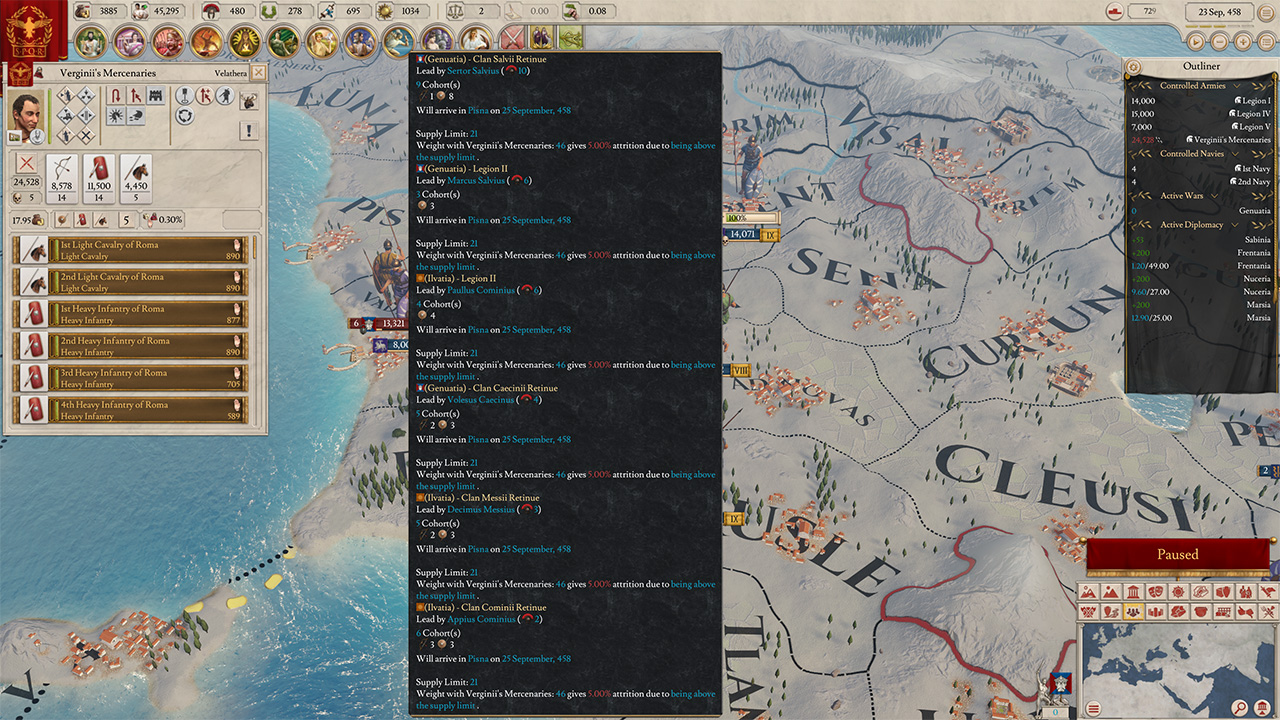
Ars Longa, Vita Brevis
The visual world of Imperator Rome is as dull as the gameplay. The legions are just static pawns peppered over the map’s uninspired surface, and only sporadically do you see them jump from one location to another. There is no animation to speak of, the troops don’t actually travel, they just magically hop from way-point to way-point. The cities, forts and other buildings are virtually non-existent graphically. There are no ambient animations, or anything to indicate that this is a living world you’re trying to conquer. Most of the time, it can barely muster the appearance of a board-game: plastic tokens staking their claim on a cardboard landscape.
One pleasant feature, bordering on novelty but much appreciated regardless, is the random face generator used for the portraits of all the Characters in the game. Through some clever technical prowess, the game creates random people that not only look unique from one another, but actually age as the game progresses. This at least makes your population feel like solid individuals, even if their randomly generated names do appear to get jumbled sometimes (I’m looking at you, Publius Publius).
Playing Imperator Rome is sometimes like being stuck in the lobby of some grander attraction, you faithfully believe more fun lies ahead if you just wait. But as long as you’re waiting, you might as well have some pleasant tunes to listen to. Artistically, this is one area where Imperator Rome thankfully shines. The music is superb. It’s epic at times, rousing at others, and melancholic when it needs to be, and really fits the time period and the theme, while still being cinematically engaging. Even after enduring long hours of slow and repetitive gameplay, the music never gets old.
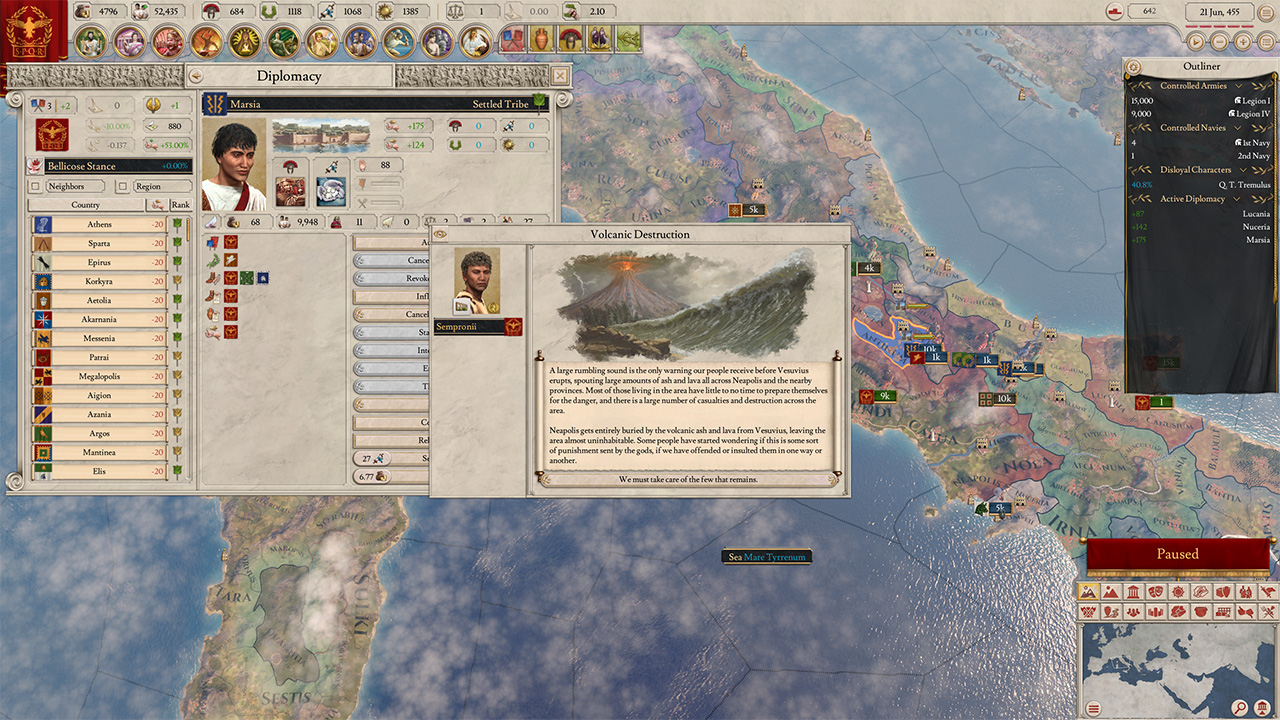
Alea Jacta Est
So far I’ve only focused on the negative, but there are a few things in Imperator Rome that actually do work well. As mentioned, I love history, and there are enough juicy historical details densely packed into the otherwise shallow gameplay that it at least kept me intrigued, leading me once or twice to Wikipedia to explore some of those details in greater depth. So in that regard, history is not just window dressing here, the devs did a great job researching Ancient Rome and folding that knowledge seamlessly into the game. I do wish this attention to detail spilled over into the surrounding nations, but as long as you stick to the game’s namesake, you’ll find it rich in historical accuracy and sumptuousness.
The world before you is truly vast. There are literally hundreds upon hundreds of nations that you can both play as, and wage war against. Likewise, if you tire of the default politics, there are three government types to choose from: republic, monarchy, and tribal. For example, my time in Frisia was more challenging, due to its tribal governance structure, but also it was more fun to play than as the de facto superpower of Rome. In a David and Goliath like scenario, it seems it’s more fun to be David, because I was less caught up in senatorial nitpicking, and could put my efforts towards external conquest rather than internal maintenance. One of the trade-offs to this, though, is that troops are more loyal to their individual tribal chieftains than to your nation as a whole, but it’s a small price to pay to be so nimble.
Managing the success of troops may seem like a chore to some, but I actually enjoyed that aspect. Each legion needs a general to command it, and depending on who you choose, the units can grow stronger or weaker. Loyalty is also a factor to consider: if it drops, they may fare poorly in combat, but if they grow too attached to their general that could potentially trigger a civil war (and one of your generals will, at some point, cross the Rubicon, so to speak). You also have to make sure they’re well supplied, or attrition will kick in; this means keeping the size of each legion carefully in mind as you push further and further outside of your boundaries.
The game currently may not offer much in the way of content, but as a platform for further development and expansion, the future looks promising. Already there is a burgeoning modding community, with quite a few helpful mods to choose from. Some add much needed interface tweaks, while others fill the gaps in the lands beyond the peninsula.
On a technical note, some players have complained of being besieged with bugs, but aside from a few stray crashes, my time stomping through ancient history was relatively pain-free. For the most part, Imperator Rome ran smoothly for very long periods of time without any hiccups, slowdowns or unexpected glitches; and with UI scaling, it works well in 4k too.
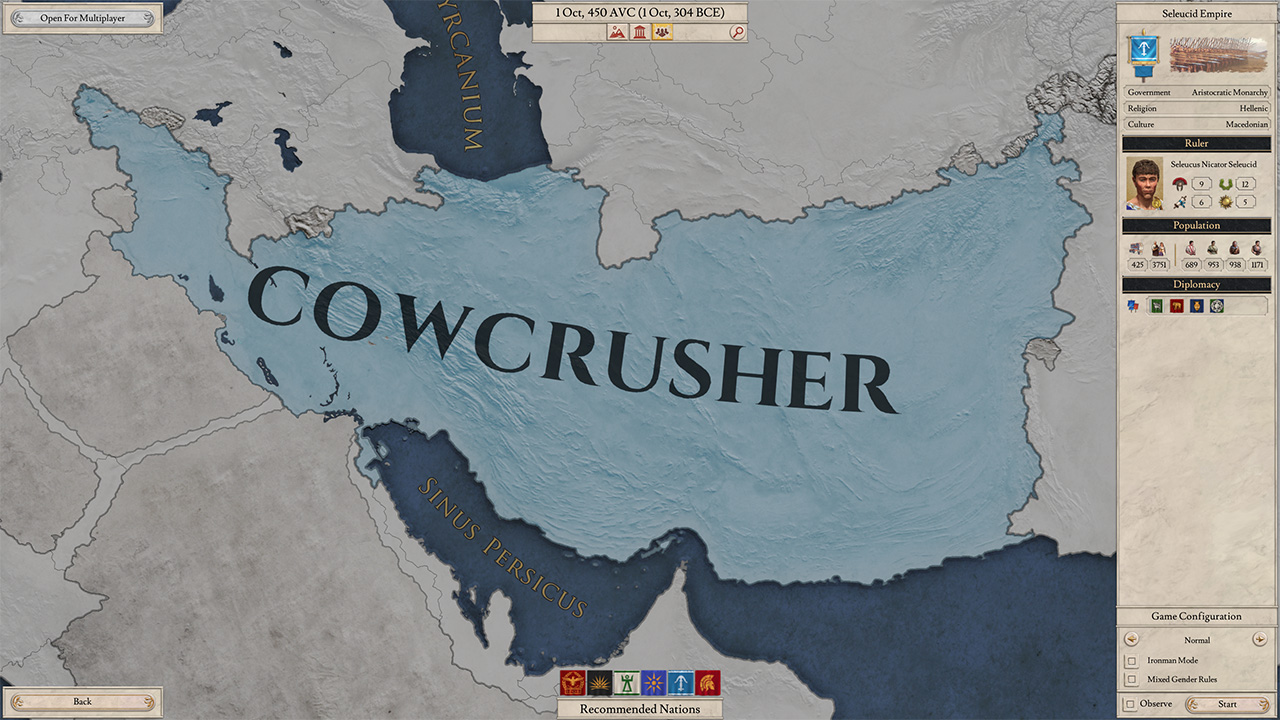
Verdict
In the end, though, Imperator Rome is a lot like the ancient Colosseum: an impressive structure that is ultimately empty. Sure, you can admire the craftsmanship of the building and all the details of the structure itself, but really it’s just a hollow space waiting to hold a more interesting spectacle. Perhaps someday through mods and the inevitable onslaught of DLC’s, the game will finally come into its own and offer players the chance to live out their fantasies of global conquest, but for now the arena stands bare.

